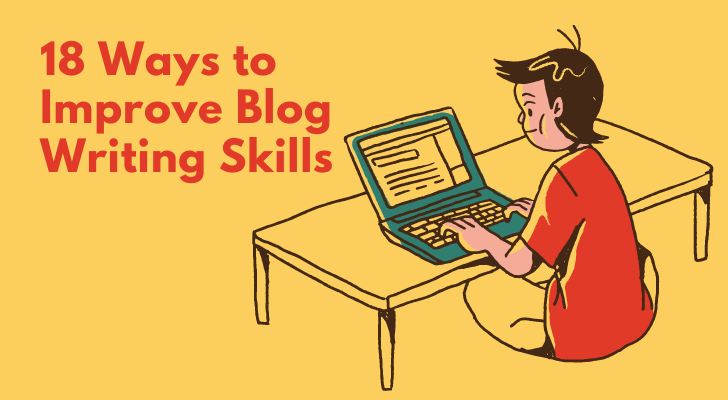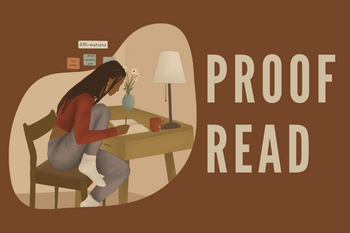Being a successful blogger is much more than simply sharing your thoughts and ideas online; it’s about crafting compelling stories that connect with readers on a deep level. But writing isn’t easy - even for the most experienced writers. Luckily, there are plenty of ways to improve your writing skills as a blogger. From finding ways to break out of writer’s block to honing in on grammar and syntax, read on for 18 tips and tricks that will help you become a better writer.

1. Writing For an Audience
When you sit down to write a blog post, it's important to keep your audience in mind.
- Who am I writing for?
- What do they want to read about?
- What will resonate with them?
Answering these questions before you start writing will help you to create content that is tailored to your audience, and that will resonate with them. Keep in mind that your audience may be different for each post - so take some time to think about who you're writing for before you start.
Once you know who your audience is, start writing in a way that speaks to them. Use language that they will understand, and avoid jargon. Be clear and concise in your writing, and make sure that each sentence has a purpose.
Remember that your readers are real people, with real lives. They don't want to be bombarded with advertising or sales pitches - so keep those to a minimum. Instead, focus on creating content that is informative, entertaining or both. If you can do this, then you're well on your way to becoming a successful blogger.
2. Write Every Day
Even if it’s just a few hundred words, the act of writing on a daily basis will help to sharpen your skills. You’ll also be able to develop your own unique style and voice – both of which are essential components of successful blogging.
Writing on a regular basis can help you become more comfortable with expressing yourself through words and can make your writing flow more smoothly. It also helps to practice different types of writing, such as expository, persuasive, and narrative. So try to set aside some time each day to write, even if it’s only for a few minutes.
If you’re not sure how to get started, try setting a goal for yourself. Instead of just deciding to “write every day,” set a specific amount of time or word count that you want to achieve each day. This will give you something concrete to work towards and make it easier to stick with your writing routine. Once you’ve established this goal, make sure to create a schedule that allows you enough time each day to hit your target.
You know by now that quality is more important than quantity. Don’t be afraid to take breaks and revisit your work when needed – this can help ensure that the content you produce is always up-to-par. As long as you remain consistent with your writing practice and strive for excellence in everything you put out, chances are good that your blog will become more popular over time.
3. Research Your Topic Every Time

You must take some time to research your topic before you start writing a blog post every time. That will require you to read, inevitably, which will help improve your writing skills too. Make sure you have all the information you need in order to write accurately and effectively. Doing research upfront will also help make sure you don’t miss any important points when crafting your blog post.
4. Outline First
It makes things so much easier for you if you create an outline of what they want to write before they start writing. This will help them organize their thoughts and structure their article in a way that is easy to follow.
Some ideas on what to include in an outline:
- The main topic or theme of the article
- A list of subtopics or points you want to make
- A rough idea of how you want the article to flow
Creating an outline before writing will help ensure that your article is well-organized and cohesive. It will also save you time in the long run, as it will be easier to write an article with a clear plan in place.
5. Keep a Journal
Keep a journal. This can be done by writing in a physical journal or by starting a blog where you document your thoughts on different topics. Keeping a journal will help you to track your progress as a writer, and it will also give you something to look back on when you need inspiration for new articles.
When starting a journal, it is important to make sure you are consistent with your entries. Even if you can only spare a few minutes each day, try to make that time count by writing something meaningful. This could be anything from your thoughts on the current news cycle to an article idea you want to explore further. You should also take the time to reflect on every entry and think about what worked and what didn’t.
Don’t forget to review your past entries and see how much progress you have made as a freelance writer. Doing this will help you stay motivated and inspired as you continue to work hard on perfecting your craft.
6. Use Active Voice
When writing blog posts, be sure to use active voice. Active voice makes your writing more engaging and easier to read. An inactive voice can make your writing sound dull and boring.
To make sure you're using active voice, pay attention to the verbs you're using. If a sentence uses a form of the verb "to be," it's likely in passive voice. For example, "The ball was thrown by the pitcher" is in passive voice. "The pitcher threw the ball" is in an active voice.
If you're not sure whether a sentence is in active or passive voice, try this trick: remove the word "by" from the sentence and see if it still makes sense. If it does, the sentence is probably in passive voice.
In general, active voice is preferable to passive voice. However, there are occasions when passive voice can be used effectively. If you want to emphasize the object of the verb rather than the subject, you can use passive voice.
For example, "The 10 photographs on the wall were taken by me" emphasizes that I took 10 photographs, while "I took the 10 photographs on the wall" emphasizes that I did the photography (which might not be as impressive).
If you're not sure whether to use active or passive voice, err on the side of active voice. Over time, you'll get a feel for when passive voice can be used for effect.
7. Use Strong Verbs/Adjectives
Strong verbs/adjectives convey action and emotion, and can really bring your writing to life. When choosing verbs, always go for the most precise and specific option – this will make your writing more interesting and engaging for readers.
And don’t forget to use active voice as much as possible – it’s another great way to add impact to your writing.
Examples:
- Sprinted
- Dived
- Explored
- Summoned
- Sparkled
- Unleashed
- Captivated
- Erupted
- Devoured
- Conquered
8. Proofread and Edit

This involves carefully reading over your work and catching any errors in grammar, spelling, punctuation, or usage that may have been overlooked during the initial drafting process. Doing this will help you become a better editor and better writer overall.
The editing exercise will also clarify your thoughts, and make sure that your writing is concise and on point. Whenever you finish writing a piece, take a step back and read through it critically, making changes as necessary. Remember, editing is an essential part of the writing process, so give your work a once-over before hitting publish.
9. Read Often
By reading regularly, you expose yourself to different writing styles and techniques that you can then incorporate into your own writing. In addition, reading helps to improve your grammar and vocabulary skills. So make sure to set aside some time each day to read, whether it’s a blog, a newspaper, or a book.
10. Write concisely
If you want to improve your writing skills as a blogger, one of the best things you can do is to write concisely. This means that you should focus on making your point quickly and without using unnecessary words. When you write concisely, you force yourself to be clear and direct, which can only improve your writing. Additionally, readers will appreciate being able to get through your blog posts more quickly, and they’re more likely to remember what they read.
Try to stick to one main point in each post and use active, strong verbs instead of weak ones. Use short sentences and paragraphs, and avoid wordy phrases. Practice writing concisely, and you’ll be on your way to becoming a better blogger in no time.
11. Use Resources
You already know that there are a ton of great blogging resources out there, so take some time to explore what’s available. It is easy to find useful information about blogging by searching for "blogging tips.".
“Blogging For Dummies” - this book offers practical advice on everything from choosing a blog topic to promoting your blog. Another great resource is the BlogHer website. This site is packed with articles, tips, and advice from successful bloggers.
When you’re looking for resources, it’s important to remember that quality trumps quantity. Don’t just focus on finding a lot of information – make sure that the information you find is high-quality and useful.
12. Set a Schedule

Creating and sticking to a writing schedule can be one of the most effective ways to become a better blogger. Set aside time each day or week to write, and stick with it. This will help you prioritize your writing and create a routine that you can stick with.
13. Take Breaks
Remember to take breaks. When you’re feeling stuck or uninspired, walk away from your computer and take a break. Go for a walk, read a book, or watch a movie. Taking breaks will help you come back to your writing with fresh eyes and a new perspective.
14. Find a Writing Partner
If you're serious about improving your writing skills as a blogger, one of the best things you can do is find a writing partner. A writing partner can offer constructive feedback and help you to improve your craft.
There are a few different ways to find a writing partner. You can join a writers' group or connect with other bloggers who share your interests. You can also hire a professional editor or coach to help you improve your writing.
Once you've found a writing partner, it's important to set some ground rules. Decide how often you'll meet, what kind of feedback you're looking for, and what type of work you'll be critiquing. Remember, the goal is to improve your writing, so don't be afraid to give and receive honest feedback.
15. Take a Writing Class
You can take a writing class that focuses on the type of writing you want to improve. For example, if you want to improve your blog posts, you could take a creative writing class or a journalism class. If you want to improve your email or business writing, you could take a business writing class.
In a writing class, you will learn how to construct sentences and paragraphs properly, how to use grammar correctly, and how to style your writing for different purposes. You will also get feedback from your instructor and classmates on your work, which will help you identify areas where you need to improve. And most importantly, taking a writing class will give you the opportunity to practice writing regularly, which is essential for improving your skills.
16. Don't Be Afraid to Ask for Help
Reach out to other bloggers in your niche and ask for advice, read books about blogging, or even join a forum dedicated to helping bloggers write better. Everyone has trouble with their writing from time to time, so don't feel bad about asking for help. Remember that there is no shame in wanting to become a better writer – it's an admirable goal that will pay dividends over the long run.
17. Join a Writers' Group
Join a writers' group that's a good fit for you. Here are some things to look for in a group:
- A focus on the type of writing you do. There are groups for fiction writers, non-fiction writers, business writers, etc. Find one that matches your interests.
- A supportive environment. You want a group of people who will give constructive feedback on your work and help you grow as a writer.
- A regular meeting schedule. This will help you stay accountable and make the most of your time in the group.
It’s a good opportunity to get feedback from other writers. If you're not sure where to start, ask around at your local library or bookstores, or search online for groups in your area.
18. Get Feedback
Even if you don’t join a writers’ group, you can find someone who will give you honest feedback on your writing, and then take their advice to heart.
Consider asking a friend, colleague, or even a professional editor to review your work. Ask them questions about what you can do better and take their advice seriously. Having someone else review your work can help you identify any problems with your writing and give you valuable insights into how to improve it.
You can also get feedback from readers by setting up a blog and allowing comments. Invite feedback from your readers and take their advice into consideration when you write your next post. This will not only help you improve as a writer, but also make your blog more engaging for readers.
Conclusion
Writing is a skill that all bloggers need to master in order to be successful. Following these 18 tips can help you improve your writing skills and become a better blogger. Developing an understanding of grammar, reading more often, and finding outside sources for inspiration are just a few ways you can sharpen your writing skills as a blogger. You are already a good writer in your own right, and you can become an excellent writer if you put in the effort, are dedicated, and keep focusing!
